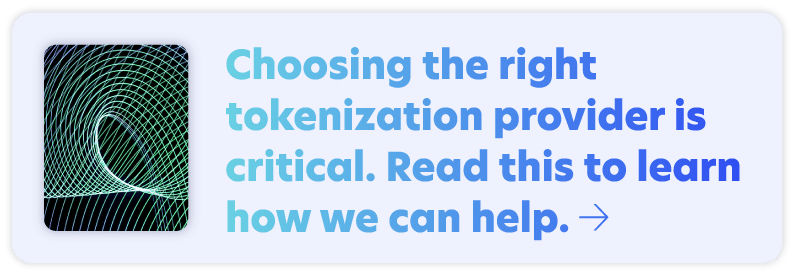IATA reported that the number of domestic and global airlines across the globe was around 22.2 million in 2021. Due to COVID-19, the previous year saw a sharp decline of 46.7%, making it the worst year for air travel demands. As people start to travel more, it’s essential for airline companies to ensure that their customers have a safe flight experience and that companies continue to drive revenue and protect their customers’ sensitive payment data. Keep reading to discover how tokenization works and the top benefits of tokenization for airline companies.
How Does Tokenization Work?
Tokenization is the process of replacing sensitive data with a randomly generated set of numbers called tokens. Sensitive data can be credit card numbers, bank account numbers, names, addresses, Social Security numbers, etc. Tokens do not contain any sensitive information that could be compromised due to a data breach. While the use case will vary, most tokens have thirteen to nineteen alphanumeric characters. These tokens can be stored and accessed in an airline’s internal environment, while the original data is kept in a secure external environment.
Unlike encryption, tokenization uses tokens that are unique and irreversible. Since tokens do not directly relate to the original input data, tokens cannot be reverted to the original data. Thus, even if a company suffers from a data breach, customers’ sensitive data will not be compromised due to tokenization. As a result, this can help businesses prevent numerous issues, such as financial losses, reputational damage, and lawsuits.
What Are the Top Benefits of Tokenization for Airline Companies?
In addition to being a best practice for security, tokenization plays a crucial role in helping airlines protect and secure customers’ sensitive payment information. Check out a few of the many benefits of tokenization for those in the airline industry.
Flexible Integrations
At IXOPAY, clients can easily integrate with various third-party platforms. These platforms may include booking engines, Online Travel Agencies (OTAs), payment gateways or processors, and loyalty programs. By having this data flexibility, airlines can securely share and receive sensitive payment data with other entities. In turn, airlines can enjoy improved acceptance rates, less latency, and a reduced PCI footprint. Indeed, this flexibility helps improve business operations, customer satisfaction, and overall revenue potential because companies are not limited to whom they can connect with regarding customers’ data.
Furthermore, IXOPAY clients use the Transparent Gateway 2.0, which allows them to securely exchange data with any third party. Indeed, TGAPI 2.0 gives clients the freedom and flexibility to limitlessly expand third-party acceptance channels without introducing risk or scope.
Better Payment Security
If you are an airline company, you may be interested in learning more about how we can help airlines. This technology tokenizes incoming sensitive data from booking engines and other partners, such as card issuers. By using this service, travel businesses have the freedom and flexibility to scale their business operations without the risk and compliance scope of handling raw payment details. Additionally, we can add greater profitability to their payment processing by increasing authorization rates with network tokens and 3-D Secure.
Remain PCI Compliant
Since airline companies accept and store card payments, they must maintain PCI compliance. Instead of worrying about the cost and time required to achieve this compliance, companies can keep their internal environment secure and out of scope by externally storing any sensitive personal and payment data processed via booking engines, management platforms, PSPs, and reservation systems. Companies can delegate much of this ongoing responsibility to third-party providers like IXOPAY. Tablet Hotels Head of Engineering Henry Mendez Jr. drives this point home by saying, “It’s beneficial for reducing risk and showing our parent company, Michelin, that security is one of our top priorities. It also has the backend flexibility we need to transfer data to our partners without bringing PCI into our networks.”
Improve Customer Satisfaction and Trust
When it comes to data, customers need and expect to feel safe sharing their personal and payment data with businesses. Since online fraud is an ongoing issue, airlines need to prioritize data security and protection for their customers. After all, an estimated 80% of customers will not purchase from an organization that has been a data breach victim, and 85% of data breach victims will share their negative experiences with others. Aside from the financial losses, cyberattacks like breaches can harm a company’s reputation as trustworthy and professional.
Luckily, security solutions like tokenization are an effective approach to ensure customers’ sensitive data doesn’t fall into the wrong hands. By partnering with a cloud tokenization provider, airline companies will not have to store payment details in their internal environment. In turn, this will virtually eliminate the risk of customer data being stolen, exposed, or compromised by hackers. Thus, customers will view the organization as a trustworthy and reputable business committed to protecting customers’ personal and payment information.
Our platform enables clients to accept, secure, and transact payment data effectively. IXOPAY Co-Founder Alex Pezold points out that “It supports a use case that’s very common in the hospitality, travel, and airline industries.” “These companies need to be able to safely collect reservation info from global distribution systems and other partners without exposing themselves to unnecessary risk.” This means that clients’ data is cleansed before receiving it, which helps clients safely and securely accept and store the data before sending it to their integration endpoint. Contact IXOPAY today, a leading cloud tokenization provider since 2010 dedicated to helping clients protect their most sensitive data, maintain critical business operations, grow their businesses, and stay out of compliance scope.
